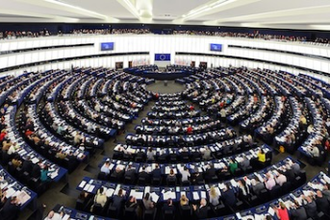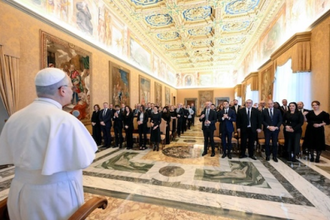Pax Christi International releases 'The Europe we want' - manifesto on May elections of European Parliament

On the occasion of the election of the members of the European Parliament (23-26 May 2019), Pax Christi International and several of its national members have issued the following manifesto, encouraging candidates and citizens to choose for a renewed European project based on solidarity, fraternity and peace.
2. Since then approaches have been developed for European cooperation, bringing peace and prosperity to an unrivalled extent across our continent. The European Coal and Steel Community of six expanded into a European Union of 28 and the countries that are bound by the European Convention on Human Rights number 47 today. All Europeans share the same fundamental rights and freedoms, peace has been largely maintained across the continent, and going to war against another European state is now simply unthinkable. In addition, crucial contributions have been made to conflict resolution and peacebuilding in other continents.
3. But these achievements are not without flaws: prosperity is unequally shared, human rights are still violated and solidarity is challenged. During the 70 years of peace, armed conflicts have reappeared on the European continent and the arms race that was reversed after the collapse of the Soviet Union has restarted, with several European countries playing a big role in it as producers and traders of sophisticated weaponry. EU Member States' arms exports account for about a quarter of total world exports, causing devastation around the world.
4. The influx of immigrants has sparked awe and fear across European societies. Feelings of insecurity undermined the confidence people had in Europe as a peace and security project. Some citizens would prefer Europe to erect walls as a way to block this influx; they associate immigrants with terror and with the possible disappearance of their identity, culture and traditional values. Politicians with nationalistic and populistic programmes reject the idea of diversity and European cooperation rather than remaining open and tolerant and tackling European challenges in a joint manner as needed.
5. We, the Pax Christi organisations linked to the Catholic peace movement across Europe, reiterate our faith in the European project:
Yes, "Europe" is still very necessary for achieving the goals of peace, prosperity and sustainability in a world shaken by inequalities, conflicts, cataclysmic climate change and geopolitical imbalances;
Yes, "Europe" should remain a beacon of hope and humanity for all those stripped of their dignity and the right to decent living conditions, and
Yes, "Europe" has the resources and courage to adjust itself to a changing world without reneging on its fundamental values, such as respect for human dignity, democracy and human rights.
6. Accordingly, we believe that these core principles should be placed again at the heart of the European project and that the forthcoming European Parliament elections taking place on 23-26 May 2019 across EU member states constitute the right moment for all those who believe in a united Europe to rally in support of it.
7. We urge our membership and fellow European citizens to have a critical look at programmes and manifestos of European political parties and individual candidates running for the European Parliament elections, with a view to choosing those that support Europe as a peace project. Your voice will be crucial, as the 2019 European Parliament elections will be fought on very key European issues and could be the most decisive election yet on the future of Europe.
II. Europe as a peace project
8. Europe has the strength, experience and resources to play an active, strong and constructive role in world affairs. It is a trusted economic partner, possesses a solid currency, and has model social legislation and skillful diplomats that can lead the population through the changes that are necessary for a sustainable world. Our movement is convinced that these capacities can achieve the goals of welfare, prosperity and security without significant military efforts. While the EU is spending huge amounts on a newly established "European Defense Fund", it should instead invest its resources in:
i. Mainstreaming the UN Sustainable Development Goals (SDGs) in all internal and external policies and make them an overarching strategy.
ii. Holding the Earth's temperature rise below 1.5° C through courageous and socially responsible limitation policies inside Europe's boundaries as well as in poor and developing countries which are equally exposed to climate change, in line with the Paris climate agreement.
iii. Developing a culture of peace and nonviolence in conflict-ridden areas through social and sustainable economic development, justice and peacebuilding initiatives, and peace training and education.
iv. Promoting and ensuring nuclear disarmament, including European states signing and ratifying the Treaty on the Prohibition of Nuclear Weapons which has been adopted at the UN.
v. Ensuring that states adhere rigorously to the Arms Trade Treaty. The EU needs to further tighten the European criteria for arms exports, and more transparency and uniform reporting obligations for states are needed, including through accountability for disputed exports.
vi. Participating in an active and constructive way in the negotiations for a strong UN Treaty on Business and Human Rights that can bring justice for victims of human rights violations, including by setting up European ombudspersons.
III. Europe as a beacon of justice
9. In the spirit of the Universal Declaration of Human rights (1948), the European Convention on Human Rights (1950) and the European Court of Human Rights (1959) were established; they should be safeguarded at all costs. They inspired other mechanisms at the international level and are supplemented within the EU by the Charter for Fundamental Rights (2000), human rights provisions in the Lisbon Treaty (2009), and jurisprudence by the European Court of Justice (since 1952). In these times when human rights and its defenders are under pressure, the EU should do more to uphold them by:
i. Confirming unequivocally its attachment to the European Convention on Human Rights by resuming its procedures for accession to it.
ii. Strengthening the capacities of the EU Fundamental Rights Agency for raising awareness about the EU Charter for Fundamental Rights and other human rights instruments, and for monitoring their compliance in Europe through policy and research work.
iii. Enhancing the worldwide protection of human rights defenders, in compliance with UN Declaration on Human Rights Defenders (1998), EU Guidelines on Human Rights Defenders (2008), and the Council of Europe recommendation on the need to strengthen the space of civil society (2018).
iv. Regulating lobbying activities within EU institutions and in Member States in conformity with the Council of Europe recommendation on lobbying in the context of public decision-making (2017).
v. Promoting a stronger framework to deal with restrictive NGO legislation both within and outside Europe and by making statements to condemn such practices in support of civil society.
IV. Europe as a land of humanity
10 In 1950, the ambition of European unity was to ensure peace through shared prosperity, within its borders and beyond. Intercontinental migration today is a reality which requires a collective European response based on solidarity, respect for human rights and justice, and effective policies for socio-economic integration. EU Member States should reinforce their migration cooperation with a view to:
i. Renegotiating the Dublin regulations with the aim to make processes of asylum requests fairer and faster, with full respect of the rights and best interest of children and with special attention for unaccompanied children.
ii. Actively implementing the UN Global Compact for Safe, Orderly and Regular Migrations which was adopted in Marrakesh (Morocco) on 10 December 2018 as an important framework for international cooperation.
iii. Adopting legislation on "humanitarian visas" as there is a need for legal and safe pathways to Europe for civilians fleeing war and conflict zones.
iv. Resisting the criminalisation of acts of solidarity by civil society and challenging questionable measures to restrict access to social protection by refugees, asylum-seekers and migrants.
v. Adopting legislation and practices that enable refugees, asylum-seekers and migrants to settle in, adapt to and enrich the very societies that provide them a shelter, in compliance with host countries' values and norms as stated by the European Convention on Human Rights and other human rights instruments.
V. Europe as a continent with a future
11 Europe is a project for its citizens and for all those who live there. It should offer opportunities to its children and youth through the appropriate educational, vocational and labor policies, which include learning to live in peace, to respect pluralism and to make diversity an asset in a multicultural society. This includes opportunities for exchanging and learning with children and youth from other continents to increase intercultural understanding. Europe should continue its investments in present and future generations by:
i. Spending more funds on international exchange projects, like "Erasmus +", for young Europeans to study, train or learn abroad, in line with the European Commission proposal for the doubling of appropriations with the next EU budget, and especially in peace and nonviolence education and training.
ii. Adopting policies and actions that promote education in human rights and democracy, mutual understanding, tolerance and respect for diversity, by making use of the outputs of and lessons learned by the Council of Europe.
iii. Investing in protecting and making accessible to all, especially the young generations, its cultural heritage as a means of understanding the composite nature of its historical, cultural and spiritual roots.
VI. The Europe we believe in and work for
12. "Europe will not be achieved in one day but through concrete action that will thus establish a de facto solidarity." These words by Robert Schuman still ring true almost 70 years after they were pronounced (9 May 1950). Europe is still incomplete and many challenges remain, but its achievements are immense. It would be folly not to acknowledge them. Yet we cannot accept that such a generous project - peace, solidarity, participation - be stopped because of fear: fear of the unknown future, fear of the diverse humanity knocking at our door, fear of a looming ecological disaster.
13. We believe that Europe is the only response to the immense challenges within our borders and outside them. More than ever before, the future of Europe is at stake. While populists and nationalist are strongly making their voice heard in the run-up to the European Parliament elections, let's take action and convince people to participate in the elections and support the Europe we want: a peaceful, fraternal, forward-looking Europe for all women and men of good will.
LINKS
Read the Manifesto in French here: www.paxchristi.net/sites/default/files/190401_pci_blueprint_for_a_european_manifesto_-_fr_final_version.pdf
Pax Christi International
www.paxchristi.net/


















